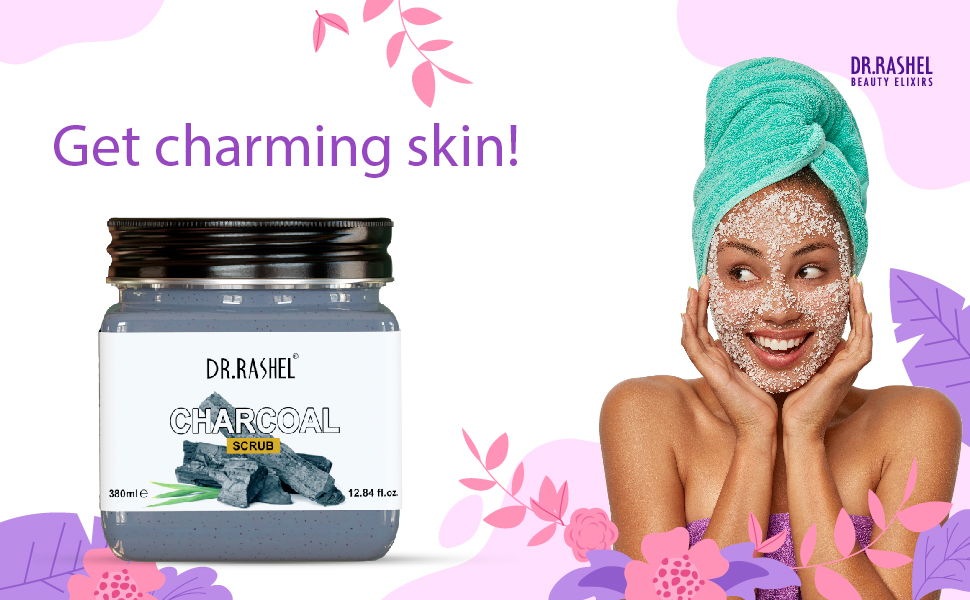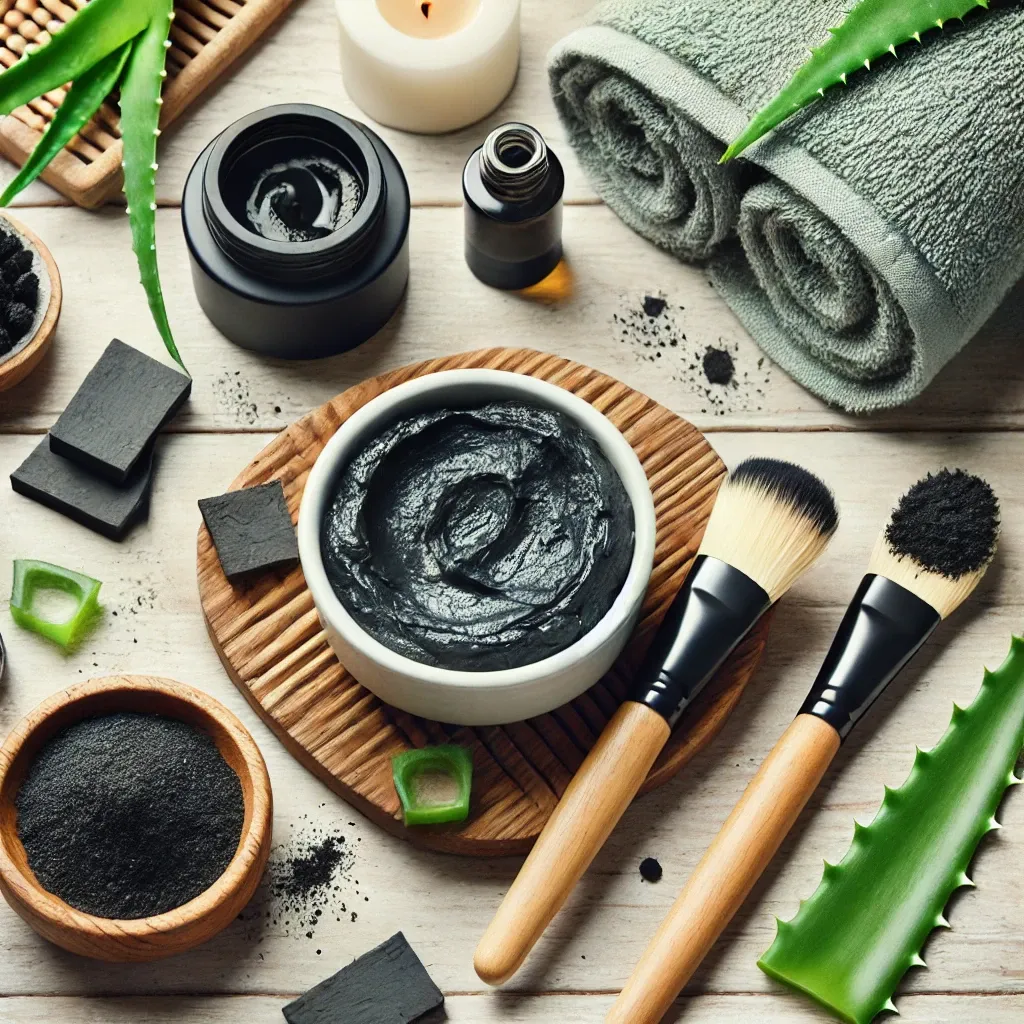
Introduction
Face masks made of charcoal have become a mainstay in beauty regimes all around the world, taking the skincare industry by storm. These masks are a popular remedy for a variety of skin issues because of their detoxifying qualities, which use activated charcoal to extract pollutants. Charcoal face masks are suitable for a variety of skin types, including oily, sensitive, acne-prone, and combination skin, due to their deep cleansing properties.
There are many people that use charcoal face masks to treat their acne, so you’re not alone. These masks assist to lessen breakouts and increase the clarity of the skin by absorbing extra oil and unclogging pores. Charcoal face masks have advantages for those with oily skin that go beyond reducing acne. Additionally, they aid in managing shine.
What is a Charcoal Face Mask?
In recent years, charcoal face masks have become increasingly popular and a staple in many skincare routines. The key component of these masks is activated charcoal, a type of carbon that has been treated to increase its surface area and become highly porous. Because of its unique structure, activated charcoal is able to absorb toxins, impurities, and excess oil from the skin, which is why the beauty industry loves it. Unlike traditional charcoal, which is found in barbecue grills, activated charcoal is made specifically for use in skincare and cosmetics products, making it safe and effective on the skin.
The growing recognition of the significance of detoxifying in skincare is responsible for the popularity of charcoal face masks. The pollution, filth, and impurities that our modern world exposes our skin to on a regular basis can cause dullness, breakouts, and other skin problems. Face masks with charcoal are praised for their deep cleansing and purifying properties, which make them a great complement to any skincare regimen. The demand for charcoal masks has increased as more individuals look for ways to counteract the negative impacts of urban living and environmental stressors.
Activated charcoal acts on the skin by a process called adsorption, which is distinct from absorption. Adsorption is the process by which molecules stick to a surface, whereas absorption is the taking up of a material by another substance. Because of its large surface area, activated charcoal can draw in and attach itself to toxins, excess sebum, and contaminants on the skin’s surface. Unwanted substances are successfully removed by this process, leaving the skin feeling more refined and clean. Charcoal face masks’ thorough cleansing and purifying qualities are especially advantageous for people with oily or acne-prone skin because they can help unclog pores and stop breakouts.
The deep penetration of charcoal face masks into the skin, which offers a more complete cleansing than is possible with ordinary cleansers, is one of their best qualities. While many conventional face cleansers are good at getting rid of makeup and debris from the surface, they frequently don’t work well for deeper impurities. The deeper layers of the skin, which are home to numerous pollutants and excess oils, are the target of charcoal face masks. For this reason, those who suffer from acne, blackheads, and clogged pores are frequently advised to use them. In order to promote a cleaner complexion and lower the chance of recurrent breakouts, the charcoal works to draw out impurities.
Exfoliating qualities are another well-known benefit of charcoal face masks. A thin coating of the mask formed on the skin when it is applied and let to dry. Dead skin cells and other debris are adhered to when it dries. It carries these impurities away with it, resulting in a mild exfoliation that exposes healthier, more glowing skin beneath. Charcoal face masks are a great choice for anyone wishing to revitalise their complexion because this procedure not only helps to purify the skin but also elevates its texture and tone.
Not all charcoal face masks are made equal, which is important to know for people who are worried about their skin’s sensitivity. A lot of products are made especially for skin types that are sensitive, so they provide the advantages of activated charcoal without irritating the skin. Charcoal is recognised for its thorough cleansing and purifying properties, but these formulas also frequently contain calming herbs like chamomile or aloe vera that help to calm the skin. Charcoal face masks are now available to a greater number of people, irrespective of their skin condition.
Benefits of Charcoal Face Masks for Acne-Prone Skin
Charcoal face masks have become a go-to solution for many individuals struggling with acne-prone skin. With their remarkable ability to draw out impurities and toxins, these masks address the root causes of acne, providing a multifaceted approach to clearer skin. The benefits of using a charcoal face mask for acne-prone skin are substantial, making it an essential addition to any skincare routine aimed at combating blemishes and achieving a healthier complexion.
The main ingredient in charcoal face masks is activated charcoal, which has a special structure that makes it capable of absorbing a large number of contaminants. Activated charcoal works like a magnet on the skin, drawing pollutants, oil, and germs that can cause acne and binding to them. For people with oily skin, where too much sebum can clog pores and cause pimples, this detoxifying action is especially helpful. Using a charcoal face mask for acne-prone skin has the advantage of thoroughly cleansing the skin, which keeps the pores free and prevents further breakouts.

How Often Should You Use a Charcoal Face Mask?
It is usually advised to use a charcoal face mask once or twice a week for the majority of skin types. With this frequency, the mask may efficiently remove excess oil and impurities from the skin without irritating or over-exfoliating it. Regular use of charcoal masks can help keep the complexion balanced and clear, avoiding problems like breakouts and congested pores. Following this regimen can produce remarkable effects for people with normal to oily skin since it gives the activated charcoal time to do its magic while still allowing the skin to rest and regenerate in between treatments.
More frequent use of a charcoal face mask may be beneficial for people with oily or acne-prone skin. In these situations, using the mask two or three times a week might help reduce excessive oil production and improve acne treatment. Activated charcoal’s deep cleansing qualities effectively unclog pores, which makes it especially helpful for people who frequently break out. But it’s crucial to keep an eye on how your skin responds to increased use. To preserve skin health, it could be prudent to cut back on frequency to once or twice a week if irritation, redness, or extreme dryness develop.
In conclusion, choosing how often to use a charcoal face mask for best results requires careful consideration of your skin type, the specific mask composition, and your particular skin conditions. The ideal frequency for most people is once or twice a week, but for those with oily or acne-prone skin, three times a week may be the most effective. Conversely, people with dry or sensitive skin should take caution and may find that using it less frequently helps. By tailoring the application to your skin’s specific needs, you may benefit from all that charcoal face masks have to offer while maintaining the highest level of skin health.
Conclusion
With a variety of advantages that address different skin issues, charcoal face masks have become a potent tool in the skincare toolbox. These masks can revolutionise your skincare regimen and help you get brighter, smoother, and more radiant skin by detoxifying the skin, effectively treating acne, and offering anti-aging benefits. Activated charcoal is a great option for all skin types because of its special qualities, which enable it to remove pollutants, manage excess oil, and improve general skin health.
Take advantage of the advantages of using charcoal face masks without hesitation. As you incorporate them into your self-care routine, you’ll notice that your skin gets smoother, clearer, and more glowing. You can get the amazing benefits of these masks with regular application, which will result in more radiant, healthy skin that exudes confidence.
FAQ's
How does a face mask made of charcoal work?
Charcoal face masks are skincare products made with activated charcoal, a highly porous material that is well-known for its capacity to draw toxins and pollutants out of the skin. When the charcoal is applied, it sticks to impurities, grime, and extra oil and pulls them out of the pores. This thorough cleansing process lessens acne, prevents clogged pores, and encourages a brighter complexion. There are several types of charcoal masks, including peel-off, wash-off, and sheet masks, and each one offers a different application experience. Selecting a mask that is appropriate for your skin type—oily, dry, or sensitive—is crucial for the greatest results. Using a charcoal face mask on a regular basis can greatly enhance the appearance of your skin and leave it feeling renewed, cleansed, and fresh.
How frequently should I apply a face mask made of charcoal?
Your skin type and personal concerns will determine how often you should use a charcoal face mask. For the majority of skin types, using a charcoal mask once or twice a week is generally advised. As a result, the mask can remove excess oil and impurities from your skin without irritating it or over-exfoliating it. Using the mask two to three times a week may help improve oil control and prevent acne in those with oily or acne-prone skin. On the other hand, to prevent irritation, people with dry or sensitive skin should only use it once every two weeks or even once a month. Always be mindful of your skin’s reaction and modify the frequency as necessary.
Add a Comment